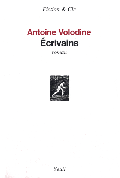Écrivains
 Antoine Volodine, Écrivains, Paris, Seuil (Fiction et Cie), 2010, 192 p.
Antoine Volodine, Écrivains, Paris, Seuil (Fiction et Cie), 2010, 192 p.
« La figure de l’écrivain telle que l’imagine Antoine Volodine. Ni alcoolique génial ni géant hugolien, ni romantique torturé, et encore moins sommité mondaine adulée par les médias. L’écrivain ici se débat contre le silence et la maladie, quand il n’est pas sur le point d’être assassiné par des fous ou des codétenus. Qu’il soit homme ou femme, il sait qu’il n’a aucun avenir. Souvent, il est analphabète, comme Kouriline, qui évoque oralement la terreur stalinienne en s’inclinant devant des poupées en ferraille. Il peut aussi lui arriver d’être déjà mort, comme Maria Trois-Cent-Treize, qui fait une conférence sur l’écriture dans l’obscurité totale qui suit son décès. Ou d’être en transe, comme Linda Woo, qui depuis sa cellule donne elle-même une définition des écrivains : “Leur mémoire est devenue un recueil de rêves. Ils inventent des mondes où l’échec est aussi systématique et cuisant que dans ce que vous appelez le monde réel.” »
(Quatrième de couverture)
Documentation critique
SAINT-ARNOULT, Thierry, « Pour interdire l’oubli : vie de Nikita Kouriline », Études Romanes de Brno : Sborník Prací Filozofické Fakulty Brněnské Univerzity, L: Řada Romanistická/Series Romanica, dossier « “Comment raconter ce qui n’a pas encore été dit?” Les Représentations de l’histoire du XXe siècle dans les littératures d’expression française et espagnole d’après 1968 », vol. 33, n° 1 (2012), p. 269-280. +++ Article de revue
### Abstract
Nothing shows that Nikita Kurilin should become a writer, certainly not a famous one. Kurilin has no literary education whatsoever. He does not even have a vocation for writing. He encounters only people from the margins of the society, outsiders like himself, outcasts. It seems Kurilin is doomed to live in oblivion forever. And still he is described by his anonymous biographer as one of the greatest polyphonic writers in the last years of existence of the Soviet Union. In fact, Nikita Kurilin was born in a not asphalted street in Jeremovo, to the south of Moscow on 27th June 1938. His mother died just after the labour. The life of Nikita Kurilin starts with this trauma which he is frequently reminded of by the exaggerated, tearing recalls of his grandmother. As years went by Kurilin began to doubt the story of his birth. In adulthood he starts an investigation that leads him to Butovo, to Butovo polygon – to a place chosen by The NKVD. 20.000 people were shot there during the purge. “Tomorrow will have been a nice Sunday” is the seventh and the last part of a novel by Antoine Volodine named Writers - published by the publishing house Edition du Seuil in 2011. It tells the story of Volodine’s entirely insignificant life. It is the last tribute to the people executed in Butovo. The story of a traumatic birth comes in concordance with the catastrophe of the History.
| Écrivains (oeuvre) | |
|---|---|
| Titre | Écrivains |
| Auteur | Antoine Volodine |
| Parution | 2010 |
| Afficher | oui |